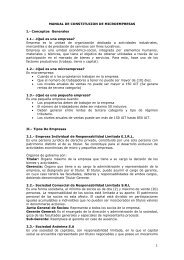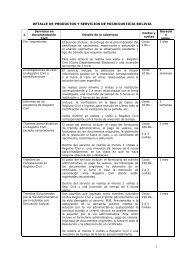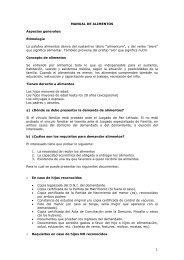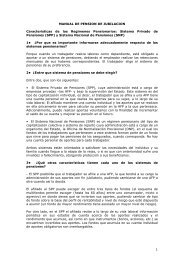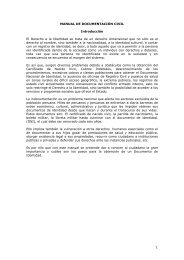ICISS report - International Coalition for the Responsibility to Protect
ICISS report - International Coalition for the Responsibility to Protect
ICISS report - International Coalition for the Responsibility to Protect
Create successful ePaper yourself
Turn your PDF publications into a flip-book with our unique Google optimized e-Paper software.
The <strong>Responsibility</strong> <strong>to</strong> <strong>Protect</strong> 36<br />
4.34 One way of helping ensure that <strong>the</strong> “right intention” criterion is satisfied is <strong>to</strong> have<br />
military intervention always take place on a collective or multilateral ra<strong>the</strong>r than singlecountry<br />
basis. Ano<strong>the</strong>r is <strong>to</strong> look <strong>to</strong> whe<strong>the</strong>r, and <strong>to</strong> what extent, <strong>the</strong> intervention is actually<br />
supported by <strong>the</strong> people <strong>for</strong> whose benefit <strong>the</strong> intervention is intended. Ano<strong>the</strong>r is <strong>to</strong> look<br />
<strong>to</strong> whe<strong>the</strong>r, and <strong>to</strong> what extent, <strong>the</strong> opinion of o<strong>the</strong>r countries in <strong>the</strong> region has been taken<br />
in<strong>to</strong> account and is supportive. In some discussions <strong>the</strong>se considerations are identified<br />
as separate criteria in <strong>the</strong>ir own right, but <strong>the</strong> Commission’s view is that <strong>the</strong>y should be<br />
regarded as sub-components of <strong>the</strong> larger element of right intention.<br />
4.35 It may not always be <strong>the</strong> case that <strong>the</strong> humanitarian motive is <strong>the</strong> only one moving<br />
<strong>the</strong> intervening state or states, even within <strong>the</strong> framework of Security Council-authorized<br />
intervention. Complete disinterestedness – <strong>the</strong> absence of any narrow self-interest at all –<br />
may be an ideal, but it is not likely always <strong>to</strong> be a reality: mixed motives, in international<br />
relations as everywhere else, are a fact of life. Moreover, <strong>the</strong> budgetary cost and risk <strong>to</strong><br />
personnel involved in any military action may in fact make it politically imperative <strong>for</strong><br />
<strong>the</strong> intervening state <strong>to</strong> be able <strong>to</strong> claim some degree of self-interest in <strong>the</strong> intervention,<br />
however altruistic its primary motive might actually be. Apart from economic or strategic<br />
interests, that self-interest could, <strong>for</strong> example, take <strong>the</strong> understandable <strong>for</strong>m of a concern<br />
<strong>to</strong> avoid refugee outflows, or a haven <strong>for</strong> drug producers or terrorists, developing in one’s<br />
neighbourhood.<br />
4.36 To those domestic constituencies who may actually demand of <strong>the</strong>ir governments,<br />
when it comes <strong>to</strong> intervention <strong>for</strong> human protection purposes, that <strong>the</strong>y not be altruistic, or<br />
moved by what we have called “right intention,” and that <strong>the</strong>y should have regard only <strong>to</strong><br />
<strong>the</strong>ir own country’s national interests, <strong>the</strong> best short answer may be that, <strong>the</strong>se days, good<br />
international citizenship is a matter of national self-interest. With <strong>the</strong> world as close and<br />
interdependent as it now is, and with crises in “faraway countries of which we know little”<br />
as capable as <strong>the</strong>y now are of generating major problems elsewhere (with refugee outflows,<br />
health pandemics, terrorism, narcotics trafficking, organized crime and <strong>the</strong> like), it is<br />
strongly arguable that it is in every country’s interest <strong>to</strong> contribute cooperatively <strong>to</strong> <strong>the</strong><br />
resolution of such problems, quite apart from <strong>the</strong> humanitarian imperative <strong>to</strong> do so. This is<br />
a <strong>the</strong>me <strong>to</strong> which we will return in our concluding chapter.<br />
Last Resort<br />
4.37 Every diplomatic and non-military avenue <strong>for</strong> <strong>the</strong> prevention or peaceful resolution<br />
of <strong>the</strong> humanitarian crisis must have been explored. The responsibility <strong>to</strong> react – with<br />
military coercion – can only be justified when <strong>the</strong> responsibility <strong>to</strong> prevent has been fully<br />
discharged. This does not necessarily mean that every such option must literally have been<br />
tried and failed: often <strong>the</strong>re will simply not be <strong>the</strong> time <strong>for</strong> that process <strong>to</strong> work itself out.<br />
But it does mean that <strong>the</strong>re must be reasonable grounds <strong>for</strong> believing that, in all <strong>the</strong><br />
circumstances, if <strong>the</strong> measure had been attempted it would not have succeeded.<br />
4.38 If <strong>the</strong> crisis in question involves a conflict between a state party and an insurgent<br />
minority, <strong>the</strong> parties must be induced <strong>to</strong> negotiate. Ceasefires, followed, if necessary, by <strong>the</strong><br />
deployment of international peacekeepers and observers are always a better option, if<br />
possible, than coercive military responses. The long-term solution <strong>for</strong> ethnic minority<br />
conflict or secessionist pressures within a state will often be some kind of devolutionist<br />
compromise that guarantees <strong>the</strong> minority its linguistic, political and cultural au<strong>to</strong>nomy,<br />
while preserving <strong>the</strong> integrity of <strong>the</strong> state in question. Only when good faith attempts <strong>to</strong>



